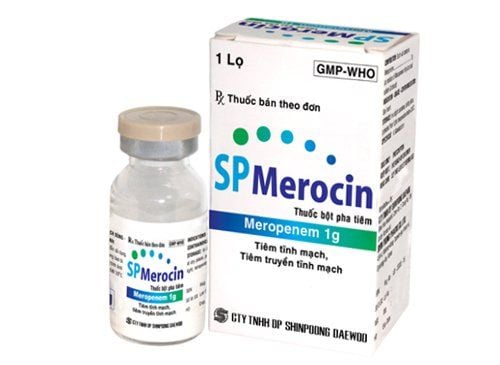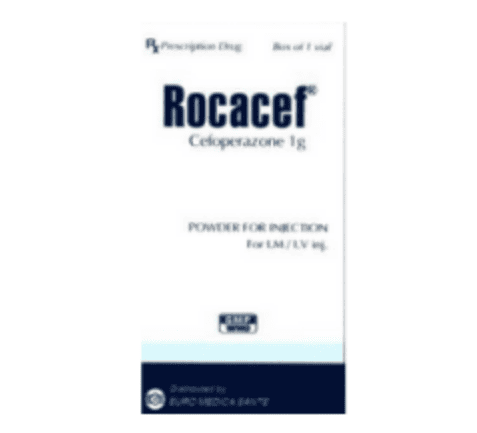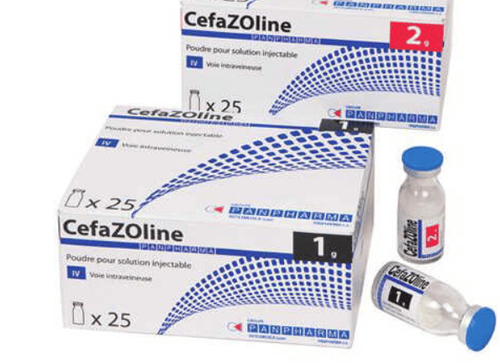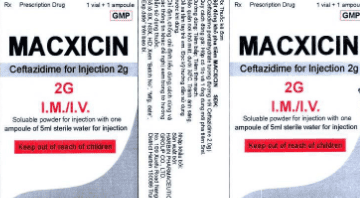This is an automatically translated article.
Medbactin belongs to the group of anti-infectives, anti-parasitics, antivirals and antifungals. The drug is in the form of film-coated tablets, packed in a box of 1 blister x 4 tablets. Before using Medbactin, patients should consult a pharmacist or specialist. Here is some information to help you better understand the uses of Medbactin.
1. Uses of Medbactin
Medbactin medicine contains the main ingredient is Tinidazol 500mg. This active substance is effective against protozoa and anaerobic bacteria by its ability to penetrate microbial cells and cause damage to DNA strands, and inhibit their synthesis.
The active ingredient Tinidazole is active against both obligate anaerobes and protozoa. The antiprotozoal activity of Tinidazole includes Entamoeba histolytica, Trichomonas vaginalis and Giardia lamblia.
Tinidazole has the ability to kill Gardnerella vaginalis and most anaerobic bacteria including: Bacteroides melaninogenicus, Bacteroides fragilis, Bacteroides spp., Eubacterium spp., Clostridium spp., Fusobacterium spp., Peptostreptococcus spp., Peptococcus spp. and Veillonella spp.
2. Indications of Medbactin
Medbactin is usually used in the following cases:
Prophylaxis:
Post-operative infections caused by anaerobic bacteria, especially those after gastrointestinal, colon and gynecological surgery. Treatment of the following infections:
Peritonitis and abscesses. Endometritis, uterine-ovarian abscess, and myositis. Sepsis. Postoperative infection. Skin and soft tissue infections. Upper and lower respiratory tract infections such as: empyema, pneumonia and lung abscess. Nonspecific vaginitis. Acute ulcerative gingivitis. Trichomoniasis of the urogenital tract. Giardiasis . Intestinal amoebiasis. Liver amoeba disease.
3. Contraindications of Medbactin
Medbactin is contraindicated in the following cases:
Pregnant women in the first 3 months of pregnancy; Breastfeeding mothers; People who are having an organic neurological disorder; Persons with known hypersensitivity to any ingredient or excipient of Medbactin; People with a history of or blood-forming disorders.
4. Dosage and how to use Medbactin
How to use: Medbactin drug is taken orally, a single dose during or after eating. In some cases, Medbactin can also be given intravenously.
Reference dosage:
To prevent infection after surgery:
For adults, take a single dose of 2g 12 hours before surgery. Treatment of anaerobic bacterial infections:
For adults: Take 2g on the first day. Then reduce the dose to 1g/time/day or 500mg/time/day. Use for about 5-6 days or according to the patient's clinical results. In case the patient cannot use it orally, 400ml of 2mg/ml solution (equivalent to 800mg Medbactin) can be infused intravenously at the rate of 10ml/min. Continue the daily infusion of 800mg/time or 400mg/times/day, until the patient is able to take the drug orally. Children under 12 years of age: Medbactin is not recommended. Treatment of non-specific vaginitis:
For adults: Take a single oral dose of 2g. Treatment of acute gingivitis:
For adults: Take a single dose of 2g. Treatment of urinary tract trichomoniasis:
For adults: Take a single dose of 2g. For children: Use a single dose of 50-75mg/kg body weight. If necessary, the dose may have to be repeated one more time. Treatment of Giardia:
For adults: Take a single dose of Medbactin 2g/day or 1 tablet 150mg x 2 times/day, for 7 days. For children: Medbactin single dose 50-75mg/kg body weight. If necessary, this dose can be repeated one more time. Treatment of intestinal amoeba:
For adults: Use a single dose of Medbactin 2g for 2-3 days or 600mg x 2 times/day, within 5 days. When using a single dose within 3 days without achieving a therapeutic effect, it is possible to continue taking the drug until the 6th. For children: Use a single dose of 50-60mg/kg body weight/day, in 3 days in a row. Treatment of hepatic amoeba:
For adults:
Oral administration: The total dose of Medbactin varies from 4.5 - 12g, depending on the patient's response to the drug. In some cases, when treatment with Medbactin for 3 days does not achieve the expected effect, the treatment can be continued until the 6th day. For children:
Take a single dose of Medbactin from 50 to 60 mg/day. kg body weight/day, for 5 consecutive days.
5. Be careful when taking Medbactin
Alcohol should be avoided during treatment with Medbactin because of the potential for disulfiram-like reactions (abdominal cramps, flushing, vomiting and tachycardia). Drugs with the same chemical structure as Medbactin often cause various neurological disorders such as dizziness, vertigo, ataxia, peripheral neuropathy and (rarely) convulsions. Patients should discontinue Medbactin if there are any neurological abnormalities during therapy. The effects of Medbactin on the ability to drive or use machines have not been studied.
6. Medbactin drug interactions
Medbactin may have an interaction reaction if used concomitantly with alcohol. Patients should avoid alcohol for 72 hours after taking Medbactin.
To avoid interactions, before being prescribed Medbactin, the patient should inform the doctor about the drugs they are using, including functional foods. The doctor will base on that to prescribe the appropriate Medbactin.
7. Medbactin side effects
At therapeutic doses, Medbactin is well tolerated. However, during the use of Medbactin, patients may still experience side effects such as nausea, loss of appetite, vomiting, metallic taste in the tongue, diarrhea, transient leukopenia, headache, moss. tired tongue, dark urine and abdominal pain. Serious hypersensitivity reactions to Medbactin may also occur, such as skin rash, urticaria, pruritus and angioedema. In addition, patients taking Medbactin may also experience neurological disorders such as dizziness, vertigo, ataxia, peripheral neuropathy and rarely convulsions. If you experience these symptoms, you need to stop using Medbactin and notify your doctor for appropriate treatment.
8. Precautions when taking Medbactin
Care should be taken when using Medbactin for people with severe liver and kidney failure. Absolutely do not use when Medbactin has signs of discoloration, mold, watery or expired. Above is all information about Medbactin, patients need to read carefully the instructions for use, consult a doctor / pharmacist before using. Note, Medbactin is a prescription drug, patients need to use the drug as prescribed by the doctor, absolutely do not self-treat at home.
Please dial HOTLINE for more information or register for an appointment HERE. Download MyVinmec app to make appointments faster and to manage your bookings easily.













